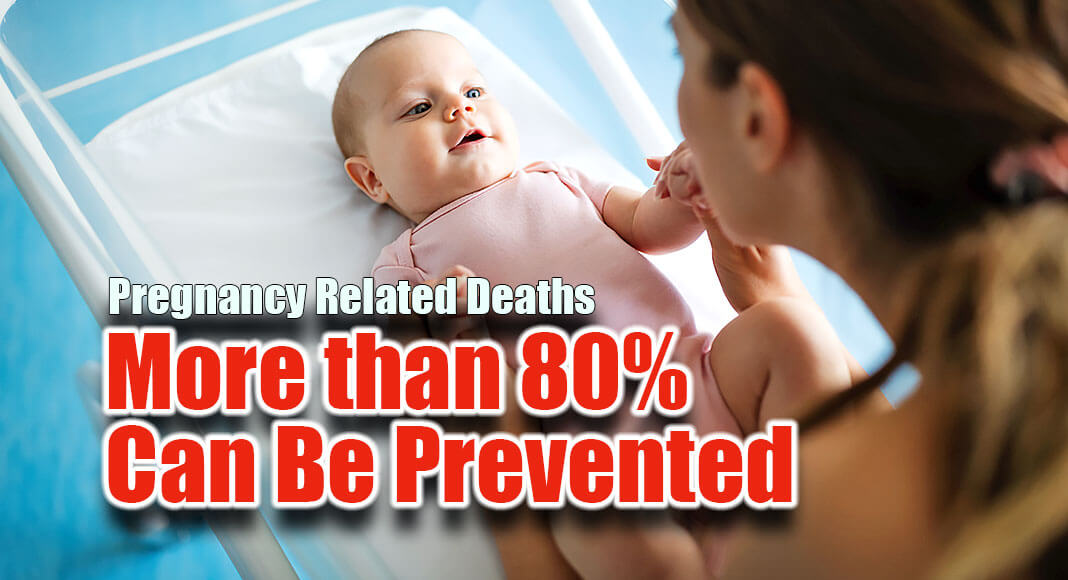
Mega Doctor News
CDC – More than 80% of pregnancy-related deaths were preventable, according to 2017-2019 data from Maternal Mortality Review Committees (MMRCs), which are representatives of diverse clinical and non-clinical backgrounds who review the circumstances around pregnancy-related deaths to identify recommendations to prevent future deaths. Information from MMRCs in 36 U.S. states on leading causes of death by race and ethnicity can be used to prioritize interventions that can save lives and reduce health disparities.
“The report paints a much clearer picture of pregnancy-related deaths in this country,” said Wanda Barfield, M.D., M.P.H., director of CDC’s Division of Reproductive Health at the National Center for Chronic Disease Prevention and Health Promotion. “The majority of pregnancy-related deaths were preventable, highlighting the need for quality improvement initiatives in states, hospitals, and communities that ensure all people who are pregnant or postpartum get the right care at the right time.”
Key Findings:
Among pregnancy-related deaths with information on timing, 22% of deaths occurred during pregnancy, 25% occurred on the day of delivery or within 7 days after, and 53% occurred between 7 days to 1 year after pregnancy.
The leading underlying causes of pregnancy-related death include:
- Mental health conditions (including deaths to suicide and overdose/poisoning related to substance use disorder) (23%)
- Excessive bleeding (hemorrhage) (14%)
- Cardiac and coronary conditions (relating to the heart) (13%)
- Infection (9%)
- Thrombotic embolism (a type of blood clot) (9%)
- Cardiomyopathy (a disease of the heart muscle) (9%)
- Hypertensive disorders of pregnancy (relating to high blood pressure) (7%)
The leading underlying cause of death varied by race and ethnicity. Cardiac and coronary conditions were the leading underlying cause of pregnancy-related deaths among non-Hispanic Black people, mental health conditions were the leading underlying cause for Hispanic and non-Hispanic White people, and hemorrhage was the leading underlying cause for non-Hispanic Asian people.
American Indian or Alaska Native data highlighted
American Indian or Alaska Native (AI/AN) people are disproportionally impacted by pregnancy-related deaths. A second report uses an approach for classifying AI/AN populations that includes those who also identify as multi-racial or of Hispanic ethnicity.
Based on a review of pregnancy-related deaths among AI/AN people, mental health conditions and hemorrhage were the most common underlying causes of death, accounting for 50% of deaths with a known underlying cause. Most pregnancy-related deaths of AI/AN people (93%) were determined to be preventable. About 64% of deaths occurred between 7 days to 1 year after pregnancy.
Everyone can help prevent pregnancy-related deaths
More than half (53%) of pregnancy-related deaths happen up to one year after delivery. It is critical for all healthcare professionals to ask whether their patient is pregnant or has been pregnant in the last year to inform diagnosis and treatment decisions. Healthcare systems, communities, families, and other support systems need to be aware of the serious pregnancy-related complications that can happen during and after pregnancy. Listen to the concerns of people who are pregnant and have been pregnant during the last year and help them get the care they need.
Examples of prevention recommendations from MMRCs include wider access to insurance coverage to improve prenatal care initiation and follow-up after pregnancy, providing opportunities to prevent barriers to transportation to care, and the need for systems of referral and coordination.
Maternal Mortality Review Committees are the best source for prevention strategies
MMRCs are multidisciplinary committees that convene at the state or local level to comprehensively review deaths during or within one year of pregnancy. Their goal is to understand circumstances surrounding each death and develop recommendations for action to prevent deaths in the future.
This is the first information to be released under the Enhancing Reviews and Surveillance to Eliminate Maternal Mortality, a CDC-funded program to support agencies and organizations that manage MMRCs. CDC also supports the Maternal Mortality Review Information Application (MMRIA) to standardize reporting of data from MMRCs. This report reflects efforts undertaken by jurisdictions to improve their MMRC processes and use MMRIA to document and disseminate information.
Recently, CDC significantly expanded its investment in efforts to eliminate preventable pregnancy-related deaths, with new awards totaling $2.8 million to support additional MMRCs in nine jurisdictions. CDC now supports MMRCs in 39 states and one U.S. Territory. Building this important infrastructure will help better understand and prevent pregnancy-related deaths in the U.S.
Additional information:
State Strategies for Preventing Pregnancy-Related Deaths: A Guide for MMRC Data to Action provides MMRCs and their partners with a guide to help facilitate implementation of data-informed strategies to prevent pregnancy-related deaths.
For information on ways to support people who are pregnant and postpartum, visit CDC’s Hear Her campaign.
Information Source: CDC











